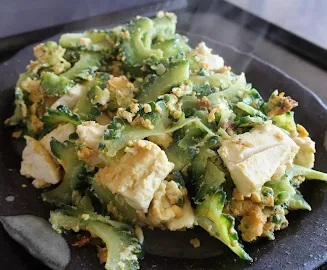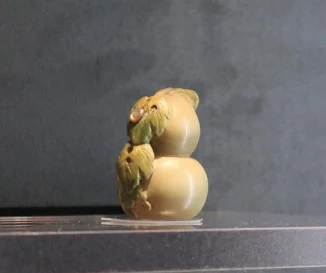This is a netsuke sculpture titled "Gourd," carved from boxwood by Kuya Nakamura. It's on show at Tokyo National Museum.
 |
| "Gourd," boxwood by Kuya Nakamura, 3cm 「ひさご」 黄楊 中村空哉作 |
The netsuke below is "Gourd," too, carved from ivory by Ichiro Inada, also at the museum.
And the dark brown tiny things on a white plate in the photo below are sliced gourd narazuke pickle I bought at Imanishi Honten, a narazuke pickle store in the Nara prefecture. They are all 3cm long but still keep the shape of gourds!
 |
| Bitter gourds ended up like this... ゴーヤの成れの果て。。。 |
If you wanna know more about tiny pickled or narazuke gourds, which go well with saki🥢🍶, read "Nara Cuisine - Narazuke Pickled Gourds"!
If you love netsuke like me, read the following posts, too!
- Netsuke and Jello - Goldfish
(If you wish to post your comment but don't have a Google account, select "anonymous" from the drop down menu titled "comment as"!)
3センチほどの根付は二つとも「ひさご」。一枚目は黄楊製で中村空哉作。二枚目は象牙で稲田一郎作です。
そして最後はゴーヤとゴーヤチャンプルーです。
ひさご、瓢箪、ゴーヤ、苦瓜、名前多すぎ~!でも根付でも、奈良漬けでも、チャンプルーでも全部大好きです。(ちなみに志賀直哉の「清兵衛と瓢箪」も大好きです!)
根付がお好きな方は以下の記事もどうぞ!
(Google アカウントを持ってない方は、コメント記入後に「Google アカウント」をクリックし、「匿名」か「名前/URL」を選択してからご記入ください!)





0 件のコメント:
コメントを投稿